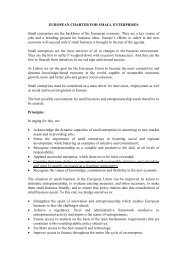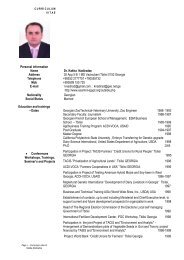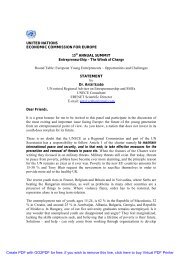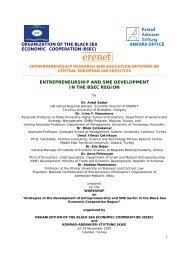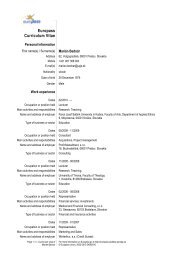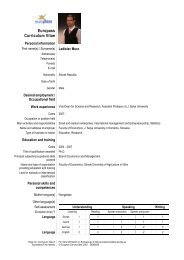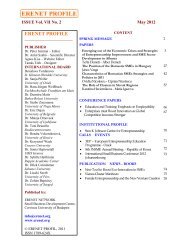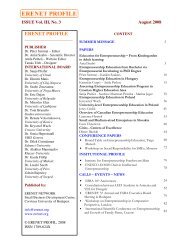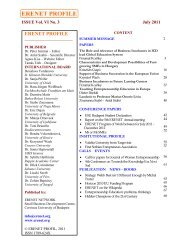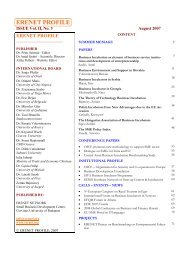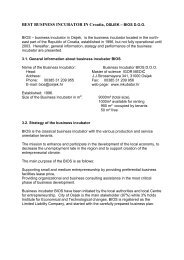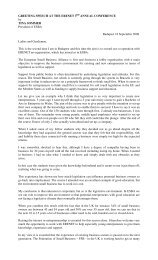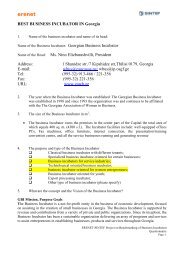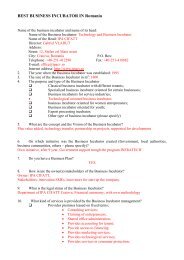Tomasz Marek Mickiewicz Born 24 December 1960 Nationality ...
Tomasz Marek Mickiewicz Born 24 December 1960 Nationality ...
Tomasz Marek Mickiewicz Born 24 December 1960 Nationality ...
You also want an ePaper? Increase the reach of your titles
YUMPU automatically turns print PDFs into web optimized ePapers that Google loves.
<strong>Tomasz</strong> <strong>Marek</strong> <strong>Mickiewicz</strong><strong>Born</strong> <strong>24</strong> <strong>December</strong> <strong>1960</strong><strong>Nationality</strong>: British, PolishE-Mail: t.mickiewicz@ucl.ac.ukWeb page: PERSONAL DETAILSSenior Lecturer in Economic Restructuring (since 2002), Social Science Department,School of Slavonic and East European Studies (SSEES), University College LondonEDUCATION1985 – 1988 Ph.D., Catholic University of Lublin (‘Long-term Trends in theStructure of Retail Prices in Poland, 1944-1984’)1979 – 1984 M.A., Catholic University of Lublin (‘Investment Cycles in the PolishEconomy’)PROFESSIONAL HISTORY: EMPLOYMENT2002- University College London – SSEES – Senior Lecturer in EconomicRestructuring1999 - 2002 University College London – SSEES - Lecturer in EconomicRestructuring1996-1999 University of London - SSEES - Lecturer in Economic Restructuring1995 – 1996 University of London – SSEES – Post-Doctoral Research Fellow1992 – 1996 Catholic University of Lublin – Lecturer in Economics1991 – 1992 University of California at Davis, Department of Economics andInstitute of Governamental Affairs - Research Assistant1990 – 1991 City of Lublin - Member of the City Board (Vice-President)1986 – 1992 Catholic University of Lublin - Assistant Lecturer - Economics<strong>Tomasz</strong> <strong>Marek</strong> <strong>Mickiewicz</strong>, page 1
OTHER APPOINTMENTS AND AFFILIATIONSCollege of Europe, Brugge, Department of Human Resource Management, MA Programme,Visiting Professor (1997-2001)Associate of the CASE Institute since 2005Member of the American Economic Association; Member of the European Association of theComparative Economic Studies; Member of the Academy of ManagementPeer review Activities:• Invited to joint the editorial board of ‘Post-Communist Economies” in September 2006• Reviews of grant proposals: the British Academy, Nuffield Fundation, ESRC• Reviews of submitted papers: Ekonomika, Comparative Economic Studies, Europe-Asia Studies, Geographica Polonica, Growth and Change: A Journal of Urban andRegional Policy, Journal of International Relations and Development, Journal ofManagement Studies, Slovo, Transnational Corporations• Reviews of submitted book proposals: Edward Elgar, Palgrave-Macmillan• Book reviews: Economic Systems, Political Studies, Slavonic and East EuropeanReview• External advisor: EU Framework 6 Project on “Changes in Industrial Competitivenessas a Factor of Integration” (HPSE-CT-2002-00148), 2005PRIZES, AWARDSEconomic Choice: the book was awarded one of the few equally-ranked prizes in thecompetition for the best economics textbook, organised by the Polish Economics Associationin 1993EXTERNALLY-FUNDED RESEARCH PROJECTS AND GRANTSSep 2001- Dec 2004 ‘Regional Labour Market Adjustment in the Accession CandidateCountries’, EU Commission Framework 5 project, project partner, andco-ordinator of work package 5 on ‘Wage and EmploymentDecisions of Enterprises in Downsized Industries’ (mainprogramme co-ordinator: Dr. P. Huber, WIFO Institute, Vienna). UCLbudget: £42,443.Aug 2003-Aug 2004Aug 2000-Aug 2003'Innovation policy issues in six applicant countries: thechallenges', EU DG Enterprise study (project partner), approximatevalue: £40,000“Innovation policy study in seven applicant countries: thechallenges”, EU DG Enterprise study EU contract: INNO-99-02(project partner), approximate value: £40,000<strong>Tomasz</strong> <strong>Marek</strong> <strong>Mickiewicz</strong>, page 2
26 January 2005 University of Bristol: paper on employment growth of SMEs19 November 2004 University of Wolverhampton: paper on employment growthof SMEs9 November 2004 University of Oxford, St Antony’s College, Russian andEuroasian Study Centre: paper on employment growth in Polishlarge companies3 November 2004 London Business School: paper on independence of managersand performance27 October 2004 Brunel University: paper on access to finance in Poland andHungary20 May 2004 University of Oxford, Economic Geography Group, paper onaccess to finance in Poland in Hungary17 May 2004 Paderewski Institute, Warsaw, presentation on unemploymentin Poland12 March 2004 University of Cambridge, 13 MET Seminar, chairing thesession on comparative institutional analysis5 March 2004 Kopint-Datorg Institute, Budapest, paper on access to financein Poland and Hungary12 <strong>December</strong> 2003 University of Bristol, paper on financial constraints ininvestment21-<strong>24</strong> July 2003 University of Tartu, presentation of the paper on labourhoarding and insiders’ control in manufacturing companies15-17 May 2003 The World Bank ABCDE Annual Conference, Paris, discussant,panel on fiscal reforms in transition countries28 February 2003 Trinity College, Dublin, presentation of the paper on wagedeterminants.23 November 2002 European School of Management, Oxford. FDI in Poland.10 May 2002: University of Madrid: paper on Deindustrialisation inTransition Economies18 January 2002: Stockholm School of Economics, seminar on Polish economiccrisis15 November 2001: Centre for Research into Communist Economies, London:presentation ‘Polish Budget Crisis and Beyond’26 July 2001: University of Tartu, Estonia: paper on ‘private benefits ofcontrol’19 June 2001: Polish University Abroad: seminar on privatisation effects inPoland17 May 2001: University of Oxford, Mansfield College: seminar oncorporate governance under post-communist transitionTV presentations:Radio:BBC 4, Eurobusiness, Polish TV (TVP).BBC World<strong>Tomasz</strong> <strong>Marek</strong> <strong>Mickiewicz</strong>, page 4
ACADEMIC SUPERVISION - PHD PROGRAMMECompleted:• Kate Bishop – Internationalisation and performance in CIS manufacturing companies –September 2003 (awarded with minor amendments). Present position: full-time researcher,UCL (previously at the office of National Statistics)• Milan Nikolic – Inflation in Russia – June 2003 (awarded with minor amendments).Present position: part-time lecturer, University of Surrey.• Roman Zyla – Small Enterprises at Ukraine – January 2002 (awarded with minoramendments). Present position: World Bank researcher, Kiev, Ukraine.In progress:• Gian Fazio – Foreign Direct investment and employment growth of the transnationalcorporations• Jong-Kyu Lee (ORS award) – Economic growth in transition countries• Beata Manthey –Regional Labour Markets in Poland and Spain• Venla Sipila – Russian financial crisis of 1998PhD examiner for: London School of Economics, Imperial College London, University ofStaffordshireTEACHING ACTIVITYKey points on enabling activity in teaching:When I joined SSEES as a permanent member of staff in 1996, the number of BA studentstaking the only social science programme (Contemporary East European Studies) each yearwas less than 10. A major reform of our BA teaching in economics was undertaken jointly byProf. Alan Smith and myself. This resulted in the launch of a new BA in Economics andBusiness with East European Studies (EBEES) in 1999, shortly before SSEES merged withUCL. From the very outset, I have been the programme director for EBEES and retained thisrole until very recently. Initially, as the number of economists on the staff of SSEES variedbetween two and three, the launch of the programme was possible only thanks to co-operationwith Birkbeck College and the link established with them in which I played an active rolefrom the outset. Once we joined UCL, we further redesigned the programme to takeadvantage of synergies within UCL. The BA EBEES programme became the most successfulprogramme at SSEES, and a critical factor in placing SSEES on a far stronger financialfooting. EBEES remains the single most popular programme at SSEES and in addition tohome and EU candidates, it attracts the largest number of overseas students at SSEES.Demand is still rising and, as a consequence, the entry criteria have been continuouslyupgraded. The programme was awarded 23 out of <strong>24</strong> in the teaching quality assessment taken.It is listed amongst the best BA programmes in economics in the UK (see The Sunday Times2005 ranking). Its strength lies in an innovative approach, which combines discipline-basedknowledge with economic policy issues relevant to the core SSEES region. .I then turned my attention to the MA level, becoming the programme director for the MAPolitical Economy of Russian and Eastern Europe. Based on consensus with all my colleaguesat SSEES, the MA reform was introduced in two phases. First, as implemented since 2004, we<strong>Tomasz</strong> <strong>Marek</strong> <strong>Mickiewicz</strong>, page 5
changed the format of economics teaching from full units into half units to make it compatiblewith the rest of UCL. That resulted in students from the School of Public Policy being able tocombine our courses with their core subjects and vice versa. It also made the programme moreaccessible to the visiting students. In addition, methodology training was strengthened by theintroduction of modules on quantitative and qualitative methods, which also met ESRCrequirements. The second, even more important phase however, is the new MA inComparative Business Economics, which started in 2006/7. The programme fits very wellwith the overall UCL strategy of expansion in post-graduate teaching. It also responds tochanges in our own field of research, as our region of interest is becoming more economically(and politically) integrated with the economic centre of Europe. Again, the programmecomponents rely on innovative design, which combines topics central to current developmentsin economic research with reference to the SSEES region. An example is the new half courseunit in Corporate Governance, Privatisation and Restructuring.Finally, I co-ordinate all economics teaching at SSEES UCL, as head of the economicscluster.Further details:• Key teaching training undertaken: 1999-2003: University of London and UCLprogrammes for lecturers, modules on assessment methods, presentation skills, lecturingskills, working with small groups, membership in job-selection panels, disabilityawareness• Courses taught at SSEES/UCL• MA Corporate Governance, Privatisation and Restructuring (1/2 unit)• MA Economics of Transition (1/2 unit)• BA Emerging Market Economies (contribute 5 lectures)• Other Courses taught previously:• MA Economic Transition in Russia and Central Europe (SSEES)• MA EU Enlargement, Human Resource Development and Institution Building inEastern Europe (College of Europe, Brugge)• BA Topics in Microeconomics (SSEES, until 2005; 1/2 unit, 2 nd year; contents: labour,models of the firm)• BA Introduction to Economics (SSEES, Catholic University of Lublin)• BA Applied Economics (SSEES)• BA Intermediate Microeconomics (Catholic University of Lublin)• BA Public Choice (Catholic University of Lublin)<strong>Tomasz</strong> <strong>Marek</strong> <strong>Mickiewicz</strong>, page 6
ENABLING ACTIVITYIn addition to the contributions to teaching covered in the previous section, other keyenabling roles played within and outside the department include the following:• Director of the ‘Centre for the Study of Economic and Social Change in Europe’. TheCentre was launched in 2002 to create a focus for research, for SSEES and beyond. Wecombine internal funding with external funding (a recent example: sponsorship receivedfrom BICEPS (Latvia), which not only led to a successful two-day workshop 2005). As aresult, we were able to run a successful series of seminars, workshops and conferences,which helped to make SSEES a leading U.K. based institution conducting economicresearch on ‘wider’ Europe and considerably raise our profile on the eve of the RAE. TheCentre’s activities include the electronic publication of a working paper series, thatattracts contributions not only from our own staff, but also from leading researchers fromoutside SSEES and is regularly referred to by some leading sources of researchinformation on our area, including the World Bank ‘Beyond Transition’ / ‘Transition’newsletter.• Co-ordinator of the ‘Managing Economic Transition’ Network. Launched in 1999 jointlywith colleagues from Manchester, the network now includes over one hundred researchersfrom the U.K. and continental Europe, and so far has organised 17 research seminars inBrighton, Bristol, Cambridge, Kingston, Manchester, Northampton, UCL andWolverhampton. It became a regular platform for discussing research focused on theprocess of economic and institutional change in Europe, and has attracted key speakersfrom the U.K. and continental Europe.In addition, I served on a number of committees, with two of them directly linked to policymakingand enabling:• Member of the Senior Management Group, SSEES UCL• Member of the Research and Funding Committee• MA Programme Director: Political Economy of Eastern Europe and Russia since 2001;Comparative Business Economics since 2006.• Member of the Postgraduate Teaching Committeeand performed two additional tasks related to enabling:• Chair of the Examination Board, Social Sciences 2003-2005• Admissions tutor and programme director for BA Economic and Business with EastEuropean Studies (EBEES), 1999-2002RESEARCH ACTIVITYI have had the opportunity to observe directly the functioning of the command economy, itscrisis, and finally, the transition process to the market economy. This fortunate (from theintellectual development point of view) conjuncture of historical events in part resulted in myinterest in comparative economic systems analysis.My research (MA and PhD) originated with the analysis of the command economy, and I hadthe privilege of having one of the most lucid analysts of the old system as my supervisor(Prof. Kurowski). At the time I was a research student, and later a lecturer in the economics<strong>Tomasz</strong> <strong>Marek</strong> <strong>Mickiewicz</strong>, page 7
department in late 1980s, at the Catholic University of Lublin, a unique place in the Sovietbloc, where rigorous economic discussion could be pursued with no outside interference. In1988 and 1989 I co-organised two influential conferences, which led to enormous mediaresonance and attracted those people who were later to become the key policy makers, whenthe transition programme was eventually implemented in 1990. For the first time, we wereable to discuss openly the necessity of enterprise reform and support for the private sector as aprerequisite for successful transition to a more efficient economic system.Since then, most of my contributions have been focused on microeconomic aspects, andprimarily on the control structures of industrial enterprises. In particular, several papers Iwrote and co-authored considered the role of labour in enterprises and the implications forwage and employment decisions, a theme which continued to be highly policy-relevant, dueto the design of the privatisation programmes in the transition economies. With thesubsequent unravelling of the transition process, enterprise-level analysis led me also toconsider the dynamic aspects of the transfer of ownership and control, namely theprivatisation process. One of my two most quoted articles (Baltowski and <strong>Mickiewicz</strong> 2000)considers the Polish privatisation programme outcomes (i.e. control structures of enterprises)as an interaction between the institutional framework, economic interests and ideas. Theendogeneity of ownership structures is also addressed in the empirical paper written jointlywith Igor Filatotchev and Kate Bishop (2002).On a parallel line of research, I have also been working on the implications of ownershiptransfer for both employment and wage decisions in enterprises, considering the temporaryeffects of privatisation, and contrasting privatised firms with both state firms and new privatefirms. I was one of the few researchers, who provided empirical evidence pointing to the factthat the difference between the ‘new private’ and ‘old’ firms (i.e. both state-owned andprivatised) may be as important as the traditionally considered difference between the stateand private sector. This is now becoming a popular point of view in the literature on thesubject.Gradually, my interest in corporate control and the role of ‘insiders’ in enterprises, led to amore direct focus on corporate governance issues, which, in turn, are also inherently linked tofinancial economics. Within this area, the 2001 paper with Igor Filatotchev led to a number ofcitations. The innovativeness of the paper is that it develops the idea that debt may not be ashard a disciplining device as is normally perceived: the collusion of banks (offeringintermediated finance coupled with closer individualised monitoring) with controllingstakeholders may easily lead to expropriation of minority shareholders. Much of my currentwork can be traced back to this paper, and remains at the inter-section of the comparativeeconomic systems and corporate governance issues. The selection of the paper on corporategovernance, exporting and performance (written jointly with Igor Filatotchev and NataliaIsachenkova), as one of the best papers at one of the most competitive and prestigiousconferences (Academy of Management Annual Meeting 2005), with over 5,000 submissionsfrom around the world, indicates that my current collaborative work in this area has met withmuch interest.My two books (2000; 2005) refer to the central themes in the economic transition literature.The book, which I co-authored in 2000, on ‘Unemployment in Transition’ ‘provides newinsights’ and also ‘is enjoyable to read’ (review in the Journal of Comparative Economics, 29,2001, pp. 770-772). It presents a model of transition, which is based on the differences inbehaviour of enterprises and demonstrates how privatisation interacts with fiscal issues. Thework expands in an original manner one of the central themes in the transition literature, i.e.<strong>Tomasz</strong> <strong>Marek</strong> <strong>Mickiewicz</strong>, page 8
the quest for the optimum pace of systemic change. Our contribution was to demonstrate thatwhile the slowing down of the process of change may appear to be beneficial in the short term(as in Aghion and Blanchard 1994), it is no longer a beneficial policy option when seen fromthe long term perspective.The 2005 book returns to the key tenets posited in the economic transition literature andcombines a critical theoretical analysis with a vast range of econometric tests. Some of thekey new conclusions relate to the interaction between the processes of political and economicchange and demonstrate empirically that democratic institutions and free media may facilitateconsensus and therefore reforms; evidence, which contradicts that strand in literature thatstresses the need for technocratic or even authoritarian economic-policy-making.Number of entries in Journal of Economic Literature categories in recently written papersJELCategoryYear ofpublicationEconomicSystemsFinancialeconomicsLabourQuantitativemethodsmicroeconomicsIndustrialOrganisationOthercategories2006 2 0 0 0 1 0 12005 2 0 2 2 1 1 12004 2 1 1 1 1 1 02003 0 0 0 0 0 0 22002 1 1 0 0 0 0 02001 0 1 0 0 0 0 0Total No ofentries7 3 3 3 3 2 4SELECTED PUBLICATIONSAuthored books:(1) <strong>Tomasz</strong> <strong>Mickiewicz</strong>, Economic Transition in Central Europe and the Commonwealthof Independent States, Palgrave Macmillan, Houndmills, October 2005(2) <strong>Tomasz</strong> <strong>Mickiewicz</strong>, and Janice Bell, Transitional Unemployment or Transition toUnemployment. Restructuring and Labour Markets in Eastern Europe, HarwoodAcademic Publishers, Amsterdam 2000(3) <strong>Tomasz</strong> <strong>Mickiewicz</strong>, Economic Choice, Norbertinum, Lublin 1996 (in Polish).Edited volumes:(4) <strong>Tomasz</strong> <strong>Mickiewicz</strong>, Corporate Governance in Poland and Russia, PalgraveMacmillan, Houndmills, October 2006.(5) Piotr Jaworski and <strong>Tomasz</strong> <strong>Mickiewicz</strong>, Polish EU Accession in ComparativePerspective: Macroeconomics, Finance and the Government, SSEES UCL, London,<strong>December</strong> 2005<strong>Tomasz</strong> <strong>Marek</strong> <strong>Mickiewicz</strong>, page 9
Chapters in books:(6) <strong>Tomasz</strong> <strong>Mickiewicz</strong>, ‘Corporate Governance and Finance in Russia and Poland inComparative Perpective, An Introduction’, in <strong>Tomasz</strong> <strong>Mickiewicz</strong> (ed.), CorporateGovernance in Poland and Russia, Palgrave Macmillan, Houndmills, October 2006,pp. 3-22.(7) Maciej Bałtowski and <strong>Tomasz</strong> <strong>Mickiewicz</strong>, ‘Politicians or Administrators? StateCorporate Governance In Poland’, in <strong>Tomasz</strong> <strong>Mickiewicz</strong> (ed.), CorporateGovernance in Poland and Russia, Palgrave Macmillan, Houndmills, October 2006,pp. 72-88.(8) Igor Filatochev and <strong>Tomasz</strong> <strong>Mickiewicz</strong>, ‘Private Benefits of Control and DebtFinancing’, in <strong>Tomasz</strong> <strong>Mickiewicz</strong> (ed.), Corporate Governance in Poland andRussia, Palgrave Macmillan, Houndmills, October 2006, pp. 159-176.(9) <strong>Tomasz</strong> <strong>Mickiewicz</strong> and Beata Manthey, ‘Labour Markets in Central Europe’, 2004,in: El Impacto Económico de la V Ampliación de la Unión Europea, Ministerio deEconomia, Madrid, pp. 69-80.(10) <strong>Tomasz</strong> <strong>Mickiewicz</strong> and Maciej Bałtowski, All roads lead to outside ownership:Polish piecemeal privatisation. In D. Parker, D. Sall (eds.), International Handbook onPrivatisation, Edward Elgar, Cheltenham 2003, Chapter 19(11) John Driffill and <strong>Tomasz</strong> <strong>Mickiewicz</strong>, 'The Order of Financial Liberalisation:Lessons from the Polish Experience" in Emilio Colombo and John Driffill (eds), TheRole of Financial Markets in the Transition Process, Springer, Berlin 2003, Chapter 2,pp. 13-42.(12) <strong>Tomasz</strong> <strong>Mickiewicz</strong>, ‘Convergence in Empoyment Structures: ‘Transition Countriesversus the EU – Reforms, Income Levels or Specialisation Patterns?’, in K. Piech(ed.), Economic Policy and Growth of Central and East European Countries, SSEESUCL, London 2003.(13) <strong>Tomasz</strong> <strong>Mickiewicz</strong>, Slavo Radosevic and Urmas Varblane, 'FDI in Central Europe:Short-Run Effects in Manufacturing', in N. Fabry, S. Zeghni (eds.) Transition in Asiaand Eastern and Central Europe: a closed door, two open windows?, Nova SciencePublishers, Huntington NY 2001, pp. 31-53.(14) <strong>Tomasz</strong> <strong>Mickiewicz</strong> and Marzenna Weresa, ‘Introduction and Overview’, in inM.Weresa (ed.), Foreign Direct Investment in a Transition Economy. The Polish Case,SSEES UCL, London 2000, pp. xiii-xviii.(15) <strong>Tomasz</strong> <strong>Mickiewicz</strong>, Slavo Radosevic and Urmas Varblane, ‘Foreign DirectInvestment, Structures of Employment, and Job Creation in Transition Economies(1993-1996)’, in M.Weresa (ed.), Foreign Direct Investment in a Transition Economy.The Polish Case, SSEES UCL, London 2000, pp. 41-60.(16) Janice Bell and <strong>Tomasz</strong> <strong>Mickiewicz</strong>, ‘EU Accession and Labour Markets in theVisegrad Countries, 1999’, in: Karen Henderson (ed.), Back to Europe. Central andEastern Europe and the European Union, UCL Press, London 1999, pp. 129-150.<strong>Tomasz</strong> <strong>Marek</strong> <strong>Mickiewicz</strong>, page 10
Articles in refereed journals:(17) Aidis,R., <strong>Mickiewicz</strong>,T. (2006). Entrepreneurs, Expectations and BusinessExpansion: Lessons from Lithuania. Europe-Asia Studies 58(6), 855-880.(18) <strong>Mickiewicz</strong>,T., Zalewska,A. (2006). De-Industrialisation. Rowthorn and Wells'Model Revisited. Acta Oeconomica 56(2), 143-166.(19) Janos Köllő and <strong>Tomasz</strong> <strong>Mickiewicz</strong>, ‘Wage Bargaining, Privatisation, Ability toPay and Outside Options in Hungary’, Post-Communist Economies, 2005, Vol. 17, No.4, pp. 465-483.(20) <strong>Tomasz</strong> <strong>Mickiewicz</strong>, Christopher Gerry, Kate Bishop, ‘Privatisation, CorporateControl and Employment Growth: Evidence from a Panel of Large Polish Firms,1996-2002’, Economic Systems, 2005, Vol. 29, No. 1, pp. 98-119.(21) <strong>Tomasz</strong> <strong>Mickiewicz</strong>, Kate Bishop and Urmas Varblane, ‘Financial Constraints inInvestment – Foreign versus Domestic Firms. Panel Data Results from Estonia’, 1995-1999, Acta Oeconomica, 2004, Vol. 54, No 4, pp. 425-449(22) Slavo Radosevic, Urmas Varblane and <strong>Tomasz</strong> <strong>Mickiewicz</strong>, ‘Foreign DirectInvestment and Its Effect on Employment in Central Europe’, TransnationalCorporations, 2003, Vol. 12, No 1, pp. 53-90.(23) Kate Bishop, Igor Filatotchev and <strong>Tomasz</strong> <strong>Mickiewicz</strong>, ‘Endogeneus OwnershipStructure: Factors Affecting the Post-Privatisation Equity in Largest HungarianFirms’, Acta Oeconomica, 2001, Vol. 52, No 4, pp. 443-471.(<strong>24</strong>) <strong>Tomasz</strong> <strong>Mickiewicz</strong>, Wpływ prywatyzacji i polityki fiskalnej na produkcję izatrudnienie w okresie transformacji (The Impact of Privatisation and Fiscal Policy onEmployment during the Transformation), Ekonomista, 2001, No. 6, pp. 753-778.(25) Maciej Bałtowski and <strong>Tomasz</strong> <strong>Mickiewicz</strong>, ‘Privatisation in Poland: Ten YearsAfter’, Post-Communist Economies, 2000, Vol. 12, No. 4, pp. 426-443.(26) <strong>Tomasz</strong> <strong>Mickiewicz</strong>, Dismantling the State Sector: A Supplementary Note,Communist Economies and Economic Transformation, 1998, Vol. 10, No. 4, pp. 561-563.(27) <strong>Tomasz</strong> <strong>Mickiewicz</strong>, Dismantling the State Sector in Eastern Europe: Implicationsfor Unemployment, Communist Economies and Economic Transformation, 1998, Vol.10, No. 1, pp. 47-62.(28) Janice Bell and <strong>Tomasz</strong> <strong>Mickiewicz</strong>, ‘Unemployment and State Sector Insidersduring the Economic Transition In Poland’, Most, 1997, Vol. 7, No. 1. pp. 131-157.(29) <strong>Tomasz</strong> <strong>Mickiewicz</strong>, The Spatial Dimension of Transformation: Time Pattern andOwnership Factors on the Micro Level, 1996, Europe-Asia Studies, Vol. 48, No. 7, pp.1187-1202.(30) <strong>Tomasz</strong> <strong>Mickiewicz</strong>, The State Sector During Economic Transformation:Employment, Wages and Investment, Communist Economies and EconomicTransformation, 1996, Vol. 8, No. 3, pp. 393-410.(31) <strong>Tomasz</strong> <strong>Mickiewicz</strong>, Structural Response to Economic Transformation, CommunistEconomies and Economic Transformation, 1994, Vol. 6, No. 2, pp. <strong>24</strong>7-253.(32) <strong>Tomasz</strong> <strong>Mickiewicz</strong>, ‘The State-Owned Enterprise in the Period ofTransformation’, Ekonomista, 1994, No. 5, pp. 601-614 (in Polish)(33) <strong>Tomasz</strong> <strong>Mickiewicz</strong>, The Post-Communist Economy and the Labour-ControlledEnterprise Hypothesis, Communist Economies and Economic Transformation, 1993,Vol. 5, No. 2, pp. 205-212.(34) <strong>Tomasz</strong> <strong>Mickiewicz</strong>, Microeconomic Aspects of the Systemic Transformation,Ekonomista, 1993, No. 5-6, pp. 715-721 (in Polish).(35) <strong>Tomasz</strong> <strong>Mickiewicz</strong>, Political Framework of the Economic Reform in Poland,1990, Politische Studien, Vol. 41, No. 3, pp. 320-333 (in German).<strong>Tomasz</strong> <strong>Marek</strong> <strong>Mickiewicz</strong>, page 11
Other Publications (Conference and Seminar Proceedings and Commissioned Reports)(36) Igor Filatotchev, Natalia Isachenkova and <strong>Tomasz</strong> <strong>Mickiewicz</strong>, ‘CorporateGovernance, Strategic Flexibility, Exporting and Performance of Firms in Poland andHungary’, in: Academy of Management 65 th Annual Conference. Papers andProceedings. Best Conference Papers, International Management, 2005, pp. A1-A6.(37) <strong>Tomasz</strong> <strong>Mickiewicz</strong> and Peter Hüber, ‘Wage and Employment Decisions ofEnterprises in Downsized Industries: Summary and Policy Implications’, in: Wage andEmployment Decisions of Enterprises in Downsized Industries, AccessLab Project,WIFO, Vienna, 2003.(38) Peter Hüber, Herbert Brucker, Janos Kollo, Iulia Traistaru, Regional and LabourMarket Development in Candidate Countries, AccessLab Project WIFO, Vienna 2003(39) <strong>Tomasz</strong> <strong>Mickiewicz</strong> and Slavo Radosevic, Innovation Capacities of the six EUCandidate Countries: Comparative Data Based Analysis. Report commissioned by theEU, Contract INNO-99-02.(40) <strong>Tomasz</strong> <strong>Mickiewicz</strong>, ‘Integration and Efficient Exit during the EconomicTransition’, in: Third International Conference on ‘Enterprise in Transition’. Papersand Proceedings, Split-Sibenik 1999, pp. 791-804.Selected work in progressNote:(41) Gerry,C., <strong>Mickiewicz</strong>,T. (2006), Inequality, Fiscal Capacity and the PoliticalRegime. Lessons from the Post-Communist Transition, Working Paper No 831,William Davidson Institute, University of Michigan, July 2006.(42) Natalia Isachenkova and <strong>Tomasz</strong> <strong>Mickiewicz</strong>, ‘Ownership Characteristics andAccess to Finance: Evidence from a Survey of Large Privatised Companies inHungary and Poland’, Working Paper No 666, William Davidson Institute, Universityof Michigan, March 2004(43) <strong>Tomasz</strong> <strong>Mickiewicz</strong> and Kate Bishop, ‘Wage Determination: Privatised, NewPrivate and State Owned Companies. Emprical Evidence from Panel Data’, WorkingPaper No 584, William Davidson Institute, University of Michigan, June 2003.Most of the articles published in journals were previously available as working papers,including several working papers at the William Davidson Institute, University ofMichigan, which is one of the most quoted and influential working papers series in the world(and most influential in the comparative economic systems area). I am not listing these toavoid double counting.<strong>Tomasz</strong> <strong>Marek</strong> <strong>Mickiewicz</strong>, page 12



